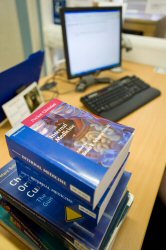
TAP lessons in blended learning made in-NESC-capable
Alison Wright is E-learning Programme Manager within NHS Education South Central's Quality, Practice Learning Team. In this new case study she explains why the TAP Certificate in Blended Learning perfectly matched NESC's aspirations to move from a position of patchy, undeveloped provision to a far more coherent, integrated approach to the exploitation of new learning technologies.
As the training and education arm of South Central Strategic Health Authority, NHS Education South Central(NESC) is responsible for ensuring that health service staff across the region's 24 NHS and Primary Care Trusts have the continually updated and improved skills to deliver the highest standards of patient care.
Serving the education and training needs of tens of thousands of staff across Hampshire, the Isle of Wight, Berkshire, Buckinghamshire and Oxfordshire is quite a challenge. And this challenge is only accentuated by the need to meet the transformational change agenda designed to drive improvements in patient care and safety. Providing access to best value training without compromising quality is paramount. It is not surprising, then, that NESC has been reviewing the potential for new technologies to enhance both the learning experience and process.
Alison Wright is E-learning Programme Manager within NESC's Quality, Practice Learning(QPL)Team. While developing the capacity and capability to deliver e-learning to staff and students is key to NHS South Central's strategic objectives, Alison stresses that e-learning must not be viewed as a standalone panacea, but another tool in the Learning and Development armoury. "When there's so much pressure to deliver training to such vast numbers of employees there can be a tendency to choose the media without giving proper consideration to the bigger picture: what's the learning need? What are the constraints of the target audience? What's the best learning strategy to meet the need? E-learning delivers thebest results when it's used as part of a blend."
The priority for Alison, tasked with supporting Trusts to make appropriate and effective use of e-learning, was to develop an approach that supported capacity and capability building, skills development and an understanding of how to embed e-learning into relevant learning blends with a direct applicability to the workplace.
E-learning has a potentially significant role to play in supporting LaD across all career pathways throughout the region, for all staff whether in clinical, management or support roles. The first step was to conduct a three-month
scoping project early in 2008, which provided a revealing snapshot of current and emerging e-learning activity across NHS South Central. The findings confirmed that Trusts and PCTs were at widely differing stages in their efforts to embed e-learning into their learning infrastructure.
Half the organisations were delivering some e-learning to staff, 38% were in the embryonic stages of introducing e-learning, while the remainder had not yet got off the starting blocks.
"It was clear that staff in many organisations were finding it difficult to know where to start with e-learning," comments Alison. "While some trusts had whole teams skilled in putting together multimedia L&D courses, a general lack of skills and confidence both in ICT and e-learning, combined with limitations in local IT infrastructures and sharing of resources, expertise and experience were proving to be major obstacles."
Alison was looking for a very particular approach to addressing these issues. A number of options were dismissed because they were simply too technical and 'medium' focused. One offering stood head and shoulders above others, however. The TAP® Certificate in Blended Learning corresponded perfectly with NESC's aspirations to move from a position of patchy, undeveloped provision to a far more coherent, integrated approach to exploiting the potential of new technologies.
Another great selling point was that The Training Foundation offered a 'season ticket' facility, which effectively allowed a large cohort of individuals with widely varying roles from disparate locations to undertake the certificate any time, any place, anywhere - online or in the classroom - within a 12 month period.
"I really liked the flexibility of this, not only for immediate needs but also for future progression training," says Alison. "It was also completely stress-free for me because I simply forwarded all interested candidates to Matt Hancocks at The Training Foundation, who did a superb job handling all the booking arrangements."
Another essential requirement was that the content of the course should be widely relevant, no matter what the role or how experienced or inexperienced the candidate. The 50-strong cohort ranged from heads of L&D, IT trainers, librarians, heads of e-learning and e-learning developers, to those with more specialist roles such as clinical pharmacists, medical device trainers and dental educators.
The TAP Certificate in Blended Learning offered something to everyone. Although a formal evaluation had yet to be completed at the time of going to press, Alison was delighted with the positive and enthusiastic feedback from course participants.
"They were really energised and reported greater levels of confidence in their abilities to apply what they'd learned back in the workplace," she comments. "They uploaded some fascinating proposals of their intentions on the tap trainer virtual learning environment; the real proof of the success of the course will be to what extent it was a catalyst for implementing a blend within their own contexts."
Paula Sands, a librarian based at St Mary's Hospital in Portsmouth, is responsible for developing and promoting resource support for University of Southampton nursing and midwifery students across Hampshire and the Isle of Wight.
She opted for doing the Certificate in Blended Learning in the classroom in September 2008 and not only found the experience thoroughly enjoyable, but also entirely expedient.
"I wanted to find out how a blended approach could improve awareness and availability of resources from the NHS and the University, as well as access," she explains.
"Creativity was another issue. I wanted a more impactful way of reinforcing learning than simply relying on handouts. Because we're in the middle of reviewing delivery of our services, the course was particularly timely."
With plans to make resource-related information more interactive, the course enlightened her on what was possible and, significantly, the importance of not going down the e-learning route for the sake of it.
"I completed the course knowing that you have to start with the learning need and objectives, not the medium and that was a crucial learning point."
A year ago Alison faced a significant challenge. "There weren't the skills, understanding and confidence out there and we were running the risk of duplicated effort and expenditure," she says. The fact that we have that all important shared understanding of the fundamentals across the region now should not only give coherence to future e-learning development and delivery, but also inject the partnership ethos that will result in essential economies and efficiencies."


